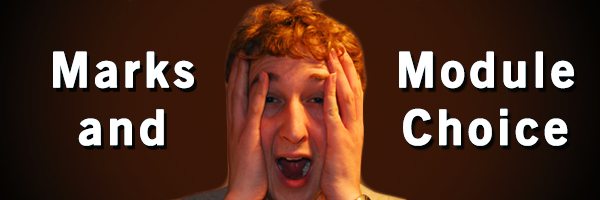Marks and Module Choice
It is that time of year again, where we are bombarded by emails from our departments saying that registration is open and it is time to choose modules for next year. Lists of modules are displayed on our computer screens; we begin to read the overviews, the prerequisites, the course reading, the assessment methods, and then the final tab, results.
What, though, is our real motivation for choosing a module? A module may be stimulating and perfect for your area of interest: just the type of course you envisaged yourself doing at university. Alas, the average is a 2:2, so you click the back button and carry on scrolling through the list, deciding to start the next ones by checking the results summary.
Whilst I understand that university is often seen by many as just a vehicle to enter the job market, and although I have no direct opposition to this, I do not feel that students’ choices in this period of their lives should be constrained by worries of performance in comparison to their peers.
However, a first class degree in X looks better than a 2:1 degree in X regardless of what modules you took.
Many will often say that some degrees are harder than others, and so people doing X get more firsts than people doing Y. That, though, is not the problem. Employers are aware of the discrepancies in subject marks. However, a first class degree in X looks better than a 2:1 degree in X regardless of what modules you took. Employers see subject X on two certificates and sensibly feel they can make a direct comparison between candidates. Everyone is aware of the increasing pressure and difficulty in finding graduate employment. Now more than ever there is huge pressure on students to achieve the highest mark possible and give themselves the best possible start for the future.
For example, take a comparison between two second-year modules in the economics department. One has an average mark of 57 percent, with 15.15 percent of students scoring a first. In contrast, the other module has an average of 69.54 percent, with over 58 percent of students attaining a first. Many may argue that the scores are higher not because the content is easier, but due to the differing assessment formats, whether that be essay-based answers or shorter style questions. Nevertheless, this still leads to students on the same course being immediately disadvantaged in comparison to their peers.
Consequently, students are left with a choice between pursuing a course of genuine interest, or opting for a module where they are more likely to achieve a higher
mark. This is not a choice I think any student should have to make; students should base their decision on a genuine interest, and not their perceived result at the end.
[divider]
Photo: flickr/stuartpilbrow

Comments